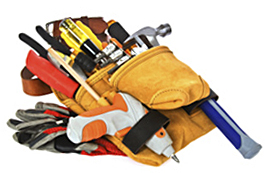
HVAC Permit Enforcement
As a participant in the state Performance Alliance, CSLB is committed to reducing energy used by warm-air heating, ventilating, and air-conditioning (HVAC) systems.
CSLB has begun accelerating its enforcement activities to ensure that new, enhanced compliance requirements are being met for the California Code of Regulations Title 24, Part 6, "Energy Efficiency Standards for Residential and Nonresidential Buildings." Amendments to Title 24, Part 6 became effective January 1, 2010, and require enhanced duct sealing, proper refrigerant charge, airflow, and fan watt draw.
Building permits are necessary to ensure that HVAC construction is performed according to state and local codes and safety standards. Failure to obtain a permit is a violation of law and exposes the homeowner to additional costs and liability. Also, the California Mechanical Code (CMC) requires a building permit for HVAC installations and modifications including, but not limited to:
- New HVAC installation;
- HVAC changeout / remodel / replacement including the air handler, coil, furnace or condenser;
- Relocation of an existing HVAC unit;
- Removal of an HVAC unit or system; or
- Adding ducting.
If a contractor fails to obtain a permit and performs contracting work on a project requiring a permit, the contractor is in legal violation and will be disciplined by CSLB, per Business and Professions Code Sections 7110 and 7090. Disciplinary action may include assessment of civil penalties of up to $5,000 per citation and/or suspension or revocation of the contractor license.
More information and training opportunities:
Institute of Heating &
Air Conditioning Industries, Inc. (IHACI)
454 W. Broadway
Glendale, CA 91204
818.551.1555
www.ihaci.org
California Energy Commission
1516 Ninth Street
Sacramento, CA 95814
916.654.4287
www.energy.ca.gov/
title24/training
For most people a "time and material contract" would be defined as an arrangement in which a contractor is paid on the basis of:
- Actual cost of direct labor, usually at specified hourly rates
- Actual cost of materials and equipment used
- Agreed-upon fixed add-ons to cover the contractor's overhead and profit (income)

This type of arrangement is acceptable for commercial projects, but not for home improvement contracts. If a homeowner is leery of signing a contract for the job—thinking you're making too much profit on such a simple project—you might say "What if we agree on the job for the cost of my time and materials?"
Unfortunately, once the consumer realizes that the total keeps going up with no finish date in sight or other problems occur, he or she is contacting CSLB with a complaint and an investigation is opened.
The first thing you learn from the Home Improvement Contracts section of the California Contractors License Law and Reference Book is that there is no provision for time and material contracts in home improvement projects. Time and material agreements violate legal subsection guidelines that are required for home improvement contracts such as start and stop dates, and the firm payment schedule that specifically references the completed work. A total or fixed contract price must be identified when payments are made; they must directly relate to work that has been completed.
If you are found to be in violation of the law, the minimum you will receive is a Business and Professions Code Section7159 violation warning letter—not what you wanted from an "easy" job.
Protect yourself, and provide the proper home improvement contract for all jobs over $500. Preprinted contract forms with the appropriate legal notices to the consumer are available through contractor book stores, business supply stores, and online business form sites. You can also download the CSLB publication Contracting for Success – A Guide to Home Improvement Contracts.
Remember: A good contract protects you and your customers.

Faster, Easier Online Surveys
Remember the long surveys you've received in the mail from CSLB's Testing division—you know, the ones that ask you to rate the importance of various tasks and knowledge in your profession? Those surveys, called occupational analysis questionnaires, assist CSLB in determining what information should be covered on licensing examinations.
The surveys are typically mailed out every five years for each licensing examination. In case you're counting, that's nine different surveys each year (45 licensing examinations divided by 5 years). That's a lot of a paper, postage, and information-processing hours.
Thank goodness for online surveys that are easier, faster, and save money. CSLB's Testing division is in the process of transitioning to a computer-based occupational analysis questionnaire where the only thing you'll have to do is click on the answer to the survey questions and send it back to CSLB.
As more online services become available, it will be even more important for you to make sure that you provide CSLB with your current e-mail address on your license renewal form or when you change your online address.
CSLB depends on contractor input in order to provide licensing examinations that reflect current trade practices and gathers this information by conducting workshops with licensees. Test questions are created and reviewed by licensees as part of the examination development process. Any contractor who participates is compensated for time and travel expenses. If you are interested in helping develop your trade's examination, contact CSLB's Testing division at 916.255.3221.
Prepare for New Mechanic's Lien Notice
CSLB reminds you that new mechanic's lien requirements take effect January 1, 2011.

A Notice of Mechanic's Lien must be served on the property owner, and a Proof of Service Affidavit to that property owner must also be completed and signed by the individual serving the Notice of Mechanic's Lien. Failure to serve a Mechanic's Lien Notice and provide a Proof of Service Affidavit will make the mechanic's lien unenforceable.
These changes are the result of Assembly Bill 457 that was signed in 2009, which changes California Civil Code Sections 3084 and 3146.